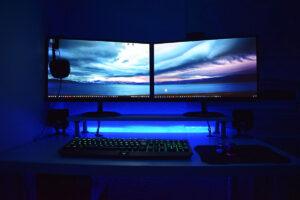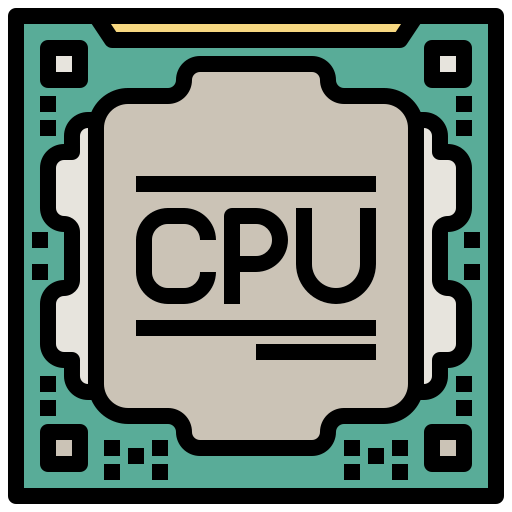That is dependent on how it is connected and whether it is used in the mirror or expand mode. Attached to the GPU and in mirror mode, the additional demand will be minor.
Using in develop mode adds extra stress to the CPU, and connecting through another port, such as USB, adds substantially more – maybe up to 10% of a low-power CPU.
CPU should be unaffected, if at all. Second monitors, mainly if utilized for menial tasks, are essentially equivalent to keeping anything open in the background on one monitor.
The only difference is that some workloads are offloaded to the GPU. You shouldn’t have any severe difficulties. We will clear your mind about Does using a second monitor affect CPU usage?
How Much Power does a dual monitor use?
Using two of these monitors to form a twin monitor arrangement and running them around the clock will add 15.628 cents to your daily power consumption (when using the average electricity rate across the US).
Does adding a second monitor affect performance?
Yes. Consuming a second screen will force your laptop to produce more graphics and use more computer resources.
Depending on your use of the display, your laptop should be able to support a second monitor without an issue. If you use it when your battery is low, it will drain your battery quicker.
More Pixel = More Gpu Being Used
So, the more pixels you have on your display, the more work the GPU needs to do. It makes no difference if your PC is idle with a blank Desktop screen open or running a AAA game.
If there are pixels, the GPU is at work.
With two 1920 x 1080 (Full HD) monitors, the graphics card must render twice as many pixels as a single 1920 x 1080 panel.
According to this theory, a single 4K monitor would contain four times the pixels of a single Full HD panel.
So, using basic arithmetic reasoning, you may conclude that a single 4K panel would demand twice as many GPU resources as twin FHD displays.
The key here is that, in principle, the quantity of PIXELS your GPU needs to produce, not the number of displays you have, determines how much of its resources must be utilized.
However, in most circumstances, the difference between utilizing a single Full HD, twin, or even triple Full HD screen has no influence.
Do CPUs affect FPS?
Can the CPU impact FPS? The capabilities of your CPU will affect your FPS; however, your GPU has a more significant influence on FPS.
It would help to balance your CPU and GPU to avoid a bottleneck. Although a CPU will not have the same effect, having a solid CPU is still highly vital.

How much energy do monitors use?
Desktop displays typically require 20 to 100 watts of electricity. The size, model, and kind of light a monitor generates impact its power usage.
If you use an average 21-inch monitor for 3 hours daily, you will spend approximately 0.3 kWh, roughly 0.01 cents per day.
Does RAM help dual monitors?
In a nutshell, sure. Even if you are not planning on playing any games and will just be using your laptop for casual online surfing or viewing YouTube videos, it is suggested that you have at least 8GB of RAM.
How Much Is Gpu Being Used When The Pc Is Sitting Idle?
You may run a basic test on your own using the task manager. With Task Manager open, go to the Performance tab and check for GPU utilization, as seen below.
If you have two graphics cards like mine, they will be featured on the menu. When the computer is idle, the integrated graphics card is utilized.
As a result, you can see how much difference two different displays may make in consumption.
Will using two monitors have any substantial influence on system speed?
There’s more to render, so yeah, a little bit more of your CPU and graphics are keeping the system functioning.
But we’re just talking about a few more CPU seconds every minute. There’s nothing you’ll notice.
Suppose you use 3D applications (such as games or rendering applications) on both screens.
You will notice a significant delay since you are dealing with double the resolution, and they are already CPU/GFX heavy.
But if you confine them to one screen (say a ” fullscreen ” window on one monitor), you won’t observe much of a slowdown.
It’s okay for general desktop use, but I’ve never had any heavy dual monitor 3D rendering on the go (not across both anyway).
However, in Windows, I notice that because I’m only using one monitor for games, the other monitor is still rendering the desktop, so when the wallpaper updates, the system slows down for a few seconds.
I’m unsure whether this would still happen in a single monitor arrangement! Even if you weren’t using it, Windows would still load the new wallpaper into memory!
- Does a second monitor use a lot of power?
- Does using two monitors slow down computing?
Related Article:
Does a second monitor use a lot of power?
You will, indeed. Simply connecting the second monitor increases the power drain.
(I believe the standard these days is approximately 10-15W.) Anything you do on it, such as watching a movie, will cause your frame rates to drop as the CPU and GPU work more.
Does using two monitors slow down Compute
Yes, it might make your system operate a bit slower, owing to the increased effort on the video card.
However, if you have a current video card with the correct drivers loaded, it should be able to manage the additional load with ease.
It is hard to determine without knowing any other information about your equipment.
Conclusion
CPU should be unaffected, if at all. Second monitors, mainly if simply utilized for menial tasks, are essentially equivalent to keeping anything open in the background on one monitor.
The only difference is that some workloads are offloaded to the GPU. You shouldn’t have any severe difficulties.

